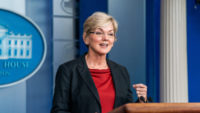The U.S. Dept. of Transportation is planning to revise its regulations covering disadvantaged business enterprises in an effort to help those small businesses better compete for contracts on aviation, highway and transit projects with federal funding.
DOT published a notice of proposed rulemaking in the Federal Register July 21 outlining the proposed changes. The DBE program is aimed at preventing discrimination and righting the ongoing impacts of historic discrimination. The proposal would clarify the official department definition of a “disadvantaged business enterprise” to align with its current guidance. Businesses that qualify as a DBE under the DOT’s regulations are at least 51% owned and controlled by someone who is a member of a historically disadvantaged group, including women, Black Americans, Hispanic Americans, Native Americans, Asian-Pacific Americans and Subcontinent Asian-Pacific Americans.
DOT also proposed steps designed to improve DBE certification processes, and amendments to DBE ownership and control requirements. Only one tier of ownership above a subsidiary DBE would be allowed, and the disadvantaged majority owner must hold decision-making power. The DBE firm must be independently viable and not regularly receive or share essential resources from another firm. The proposal also calls for raising the personal net worth cap for DBE owners from $1.32 million to $1.6 million. It would also simplify the net worth calculation by excluding retirement assets, state marital laws and community property rules.
Under the proposed change, DOT also would expand reporting requirements for federally funded projects, collecting information about the DBE contractors and other DBE bidders. For prime contractors, DOT has proposed requiring RFP respondents to submit an open-ended DBE performance plan detailing the types of work it will solicit from DBEs and a timefrance for subcontracts. The proposal also calls for limits on the total allowable credit for a prime contractor’s expenditures with DBE suppliers to no more than 50% of the contract goal in most cases.
DOT wants to expand monitoring so government agency owners of projects it funds can intervene if the prime contractor is falling behind on the contract DBE goal, and to include monitoring that the prime contractor follows prompt payment requirements, rather than relying on subcontractors’ complaints.
Contractors Eye DOT's Process
The Associated General Contractors of America will be monitoring the rulemaking process, but did not yet have a comment on the proposals, said Brian Turmail, AGC's vice president for public affairs and strategic initiatives. The Associated Builders and Contractors similarly declined to comment on the proposal for now.
"Ultimately, our long-time concern with the department’s DBE program is that it has done more to impede progress on needed infrastructure improvements than it has to expand the pool of disadvantaged business enterprises working in the industry," Turmail said in a statement.
Wendell Stemley, president of the National Association of Minority Contractors, says that proposals like the prompt payment requirement are a move in the right direction, but DBEs still face uphill competition compared to other small business enterprises because of stricter limits on company size and owner net worth. He also says the U.S. DOT needs to increase its oversight of projects it funds to ensure states are maintaining compliance with its DBE goals.
“This is a good start,” Stemley says. “We’ve still got a lot of work to do.”
The proposed changes were drafted by DOT’s Office of Civil Rights, along with the Federal Aviation Administration, Federal Highway Administration and Federal Transit Administration since the department’s DBE regulations were last updated in 2014.
In a statement, U.S. Transportation Secretary Pete Buttigieg said, “These critical updates would help ensure that small and disadvantaged businesses continue to have a fair chance to compete for federally assisted contracts.”
DOT will host a series of online public information sessions about the proposed rulemaking. It is also accepting comments on the proposal through Sept. 19 via regulations.gov.






Post a comment to this article
Report Abusive Comment